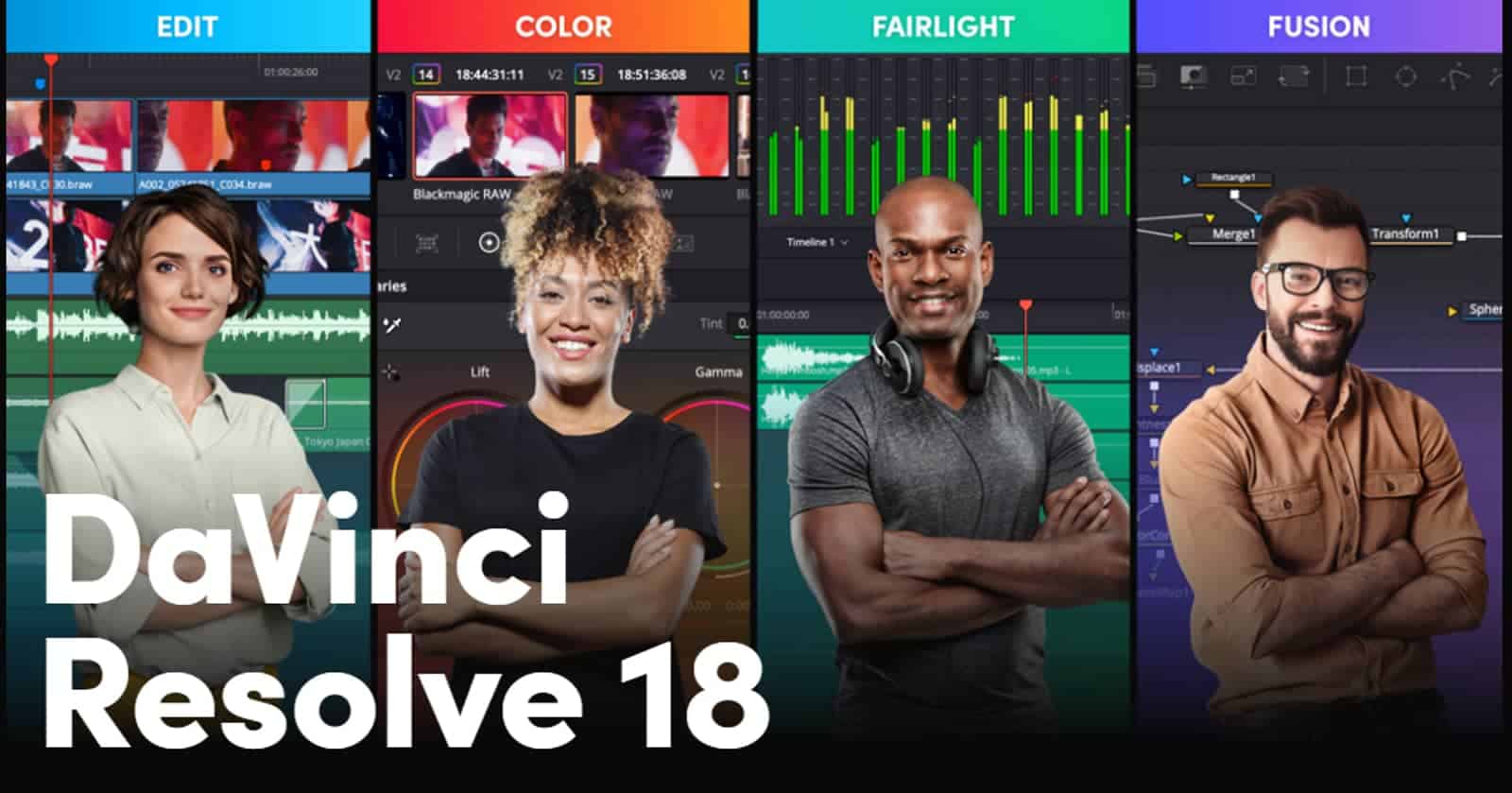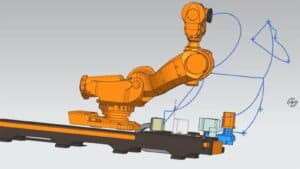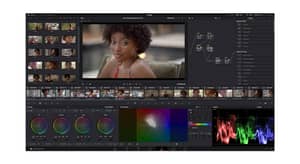
In the realm of video editing and color grading, DaVinci Resolve 18 has ascended as a coveted choice among industry aficionados, offering a broad spectrum of tools for crafting visually arresting content. As its allure burgeons alongside its potent feature suite, unearthing the best laptop for DaVinci Resolve 18 becomes an imperative endeavor for those desiring to leverage the full might of this refined software. Having dedicated innumerable hours to DaVinci Resolve, I resonate with the significance of a robust, high-performance laptop in ensuring a fluid editing voyage.
Over the years, I've meticulously combed through an extensive laptop spreadsheet, analyzing a variety of specifications and user reviews. My aim? To highlight the top-performing laptops for DaVinci Resolve 18. This software can be quite demanding, requiring a laptop with a potent processor, ample RAM, and a top-tier graphics card to render smoothly and efficiently. It's not merely about running the software; it's about enabling users to access its full suite of features without lag or stutter, thereby ensuring a seamless workflow.
My familiarity with DaVinci Resolve's requirements, cultivated through countless hours of video editing and color grading, enables me to refine my search for the ideal laptop. I abstain from generic, one-size-fits-all recommendations, focusing instead on laptops that cater specifically to the needs of DaVinci Resolve users. Whether you're a seasoned editor or a budding enthusiast, this guide will aid in your quest for the best laptop for DaVinci Resolve 18, delivering valuable insights into the nuances of laptop selection within this niche.
FAQ
Q: What are the recommended laptop specs for DaVinci Resolve 18?
The recommended laptop specs for running DaVinci Resolve 18 smoothly are as follows:
- Processor: Ryzen 7 5800U or i9-11900H
- Graphics: RTX 2060 or RTX 3070
- Storage: 1 TB SSD or 2 TB SSD
Can DaVinci Resolve 18 run on a laptop?
Yes, DaVinci Resolve 18 can run on a laptop. However, to ensure optimal performance, it is important to have a laptop with suitable specifications, especially in terms of processor, graphics, and storage.
What graphics card is required for DaVinci Resolve 18 on a laptop?
To run DaVinci Resolve 18 on a laptop, you will need a graphics card that meets the minimum requirement of GTX 1650. However, for better performance and smoother editing experience, it is recommended to have a laptop with RTX 2060 or RTX 3070 graphics.
How much RAM do I need for DaVinci Resolve 18 on a laptop?
The recommended minimum RAM for DaVinci Resolve 18 on a laptop is 16 GB. However, for more complex projects and smoother performance, it is advisable to have 32 GB or more RAM.
Is a gaming laptop suitable for running DaVinci Resolve 18?
Yes, a gaming laptop can be suitable for running DaVinci Resolve 18. Gaming laptops often come with powerful processors and graphics cards, which can handle the demanding tasks of video editing. However, it is important to ensure that the laptop meets the recommended specifications for DaVinci Resolve 18.
What are the minimum system requirements for DaVinci Resolve 18 on a laptop?
The minimum system requirements for running DaVinci Resolve 18 on a laptop are as follows:
- Processor: Ryzen 5 4600H or higher
- Graphics: GTX 1650 or higher
- Storage: 512 GB SSD or higher
- RAM: 16 GB or higher
Can I use a MacBook for DaVinci Resolve 18?
Yes, you can use a MacBook for DaVinci Resolve 18. However, it is important to note that not all MacBook models may meet the recommended specifications for optimal performance. It is advisable to check the specific MacBook model and ensure it meets the necessary requirements.
Is an SSD necessary for running DaVinci Resolve 18 on a laptop?
Yes, having an SSD (Solid State Drive) is highly recommended for running DaVinci Resolve 18 on a laptop. An SSD provides faster read and write speeds, which can significantly improve the performance of video editing software like DaVinci Resolve 18.
Are there any specific CPU requirements for DaVinci Resolve 18 on a laptop?
Yes, there are specific CPU requirements for DaVinci Resolve 18 on a laptop. The minimum requirement is a Ryzen 5 4600H or equivalent processor. For better performance, it is recommended to have a Ryzen 7 5800U or i9-11900H processor. A more powerful processor will allow for smoother editing and faster rendering times.
5 Best Laptops for DaVinci Resolve 18
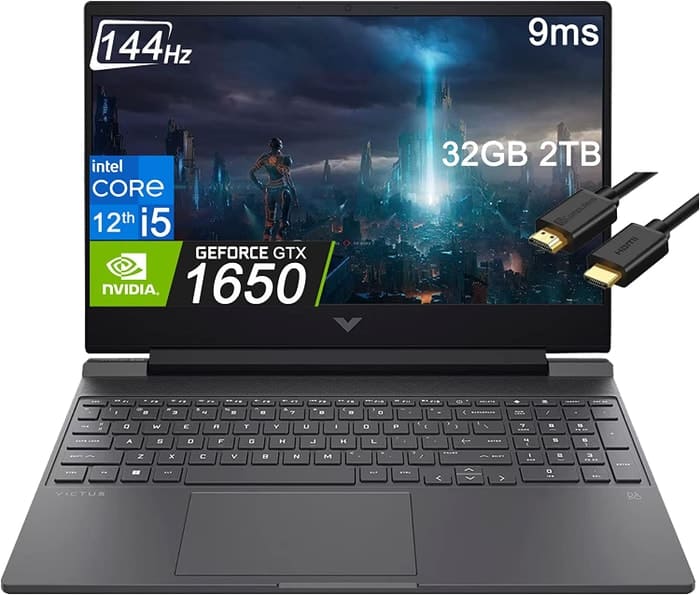
1.HP Victus 15
Economical powerhouse prioritizing performance over style- Exceptional value for money
- Respectable specs even in the base model
- Solid build quality and commitment to sustainability
- Impressive display and a generous assortment of ports
- Plain and bulky design
- Lower battery life
- Limited availability in regions outside the US
- Absence of keyboard backlight
Summary
The HP Victus 15 tackles and refines the concept of a budget gaming laptop, juxtaposing affordability with respectful specs. While its style may not earn the crown for visual appeal, its focus on performance and sustainability shines through its modest exterior. It happens to be a superior value-proposition, even with its simplest configuration, seamlessly handling graphically intense games and other routine tasks. However, prospective buyers outside US may face availability issues.
This laptop sports a sturdy but bulky frame, yet its capacity to fit comfortably in standard bags remains questionable. With an array of essential ports and an impressive 15.6-inch display that boasts sharp visuals even at high settings, it capably optimizes the gaming experience. Its 144Hz refresh rate is a delightful surprise at this price point. However, the lack of key backlighting can make nocturnal gaming challenging. Its competent CPU and GPU assure stable performance, notwithstanding the frugality.
The HP Victus 15's battery life remains subpar, akin to many other gaming laptops, reinforcing the need to keep it tethered to the charger during extended gameplay. The charging time is modestly bearable, though a Type-C charger provides a quicker alternative. Despite its aesthetic minimalism and bulkiness, the Victus 15 is a remarkable option for those seeking serious gaming potential at an affordable price.
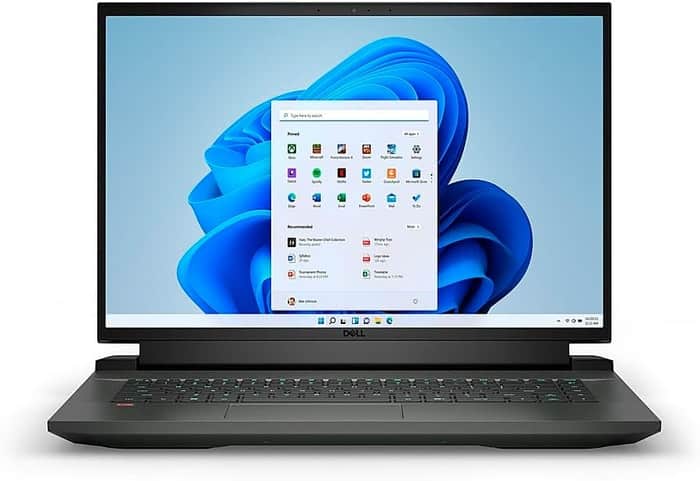
2.Dell G16
A robust balance of gaming and productivity at a cost-effective price- Strong performance in gaming and productivity tasks
- Sturdy, simple, and appealing design
- Competitive pricing
- Display lacks color depth
- Inadequate battery life
- Underpowered speakers
- Tends to get overly warm on the underside
Summary
The Dell G16 marks its territory as a sturdy match-up in the arena of gaming laptops priced under $1,500. It wields the strength of the RTX 3060, delivering exceptional gaming and productivity performance. Its minimalistic yet robust design further enhances its appeal. However, its charm doesn’t come without a few hitches, majorly due to weaker speakers, a somewhat uninspiring display, and a moderate battery life.
What certainly took reviewers by surprise is how eloquently it dealt with intense productivity-related tasks, making it a suitable option for those requiring the assist of robust software yet on a budget. When it came to gaming power, the Dell G16 did not lag far behind its higher-end rivals, despite the horsepower backing them.
Flaws become evident, however, in the form of a lackluster display, an excessively warm base, average speakers, and a below-average battery life. Even so, it's hard not to recommend it for price-sensitive customers seeking power-packed performance. The Dell G16 may not be ideal for those prioritizing depth in their display or extended battery life, in this case, an alternative could be the MSI Crosshair 15.
Reviews
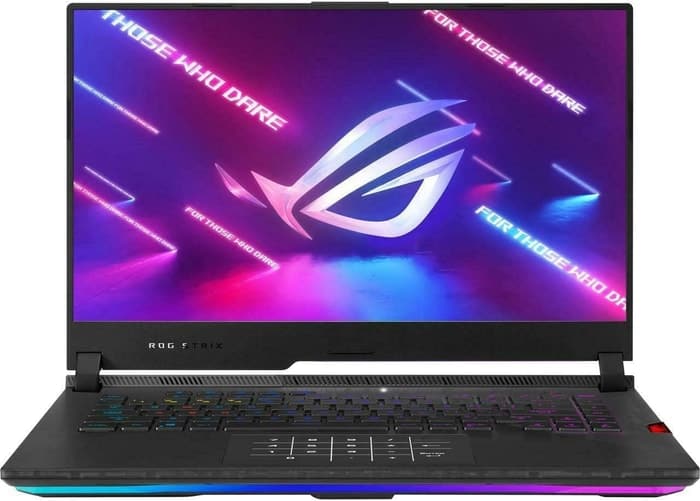
3.ASUS ROG Strix Scar
Versatility and performance meet in an accessible, full-size gaming package- Effective performance in gaming and other demanding tasks
- Compact and lightweight for the power it packs
- Manual tweaks offer better thermals
- Appreciable upgrade in hardware and features compared to previous versions
- Some components may run hot inside the chassis
- Lower efficiency of the Intel Alder Lake platform
- Short battery life
- Lack of a camera and biometrics
Summary
Coming up strong in the performance and gaming sector is the 2022 Asus ROG Strix Scar 15. This laptop presents a generous blend of power and valuable features in a fairly compact and lightweight form factor. Notably, it outperformed both the larger Scar 17 of this year and last year's AMD powered version - thanks to updated hardware and MUX implementation. However, it does struggle with heating issues, less efficient Intel Alder Lake platform, and a few ergonomic quirks.
Surprisingly, despite being more compact, it passed with flying colors when compared to the hefty Scar 17 as it maintained better balance in terms of performance. The device achieves significantly better results with a few manual tweaks and elevation to improve airflow, thus controlling thermals in this more compact version.
The year-on-year performance boost is quite noticeable as the i9+RTX 3070Ti combination offers a potent alternative to last year's Ryzen 9 +RTX 3080 model, reasonably priced and notably more powerful. It falls short in battery efficiency though, hence, a longer-lasting unplugged performance shouldn't be expected.
From an aesthetics standpoint, this laptop manages to hold its ground with a pleasing design, a good quality QHD screen, and more accommodating I/O options. Some ergonomic aspects such as status LED placement, KeyStone, limited screen angle, and the absence of a camera and biometrics could be improved. With respect to competition, Lenovo Legion laptops might pose a stiff challenge. However, the overall improvements in the Scar 15 make it a worthy contender in the gaming laptop market.
Reviews

4.Lenovo Legion Pro 7i 16
Affordable high-end gaming with a savvy yet subtle design- Remarkable performance from the i9-13900HX processor and RTX 4090 GPU
- Subtle yet sleek gamer-friendly design
- Competitive pricing for high-end configuration
- Excellent performance in appropriate power mode
- GPU may not be able to deliver its peak performance due to space constraints
- Optimal performance catered towards mid-range specs
- Pricing might still be steep for some, despite offering comparative value.
Summary
Boasting unpretentious styling, the Lenovo Legion Pro 7i packs a punch with its i9-13900HX processor and RTX 4090 graphics card, delivering impressive performance that belies its outward simplicity. Its sleek design smartly conceals its gamer-centric aspect without drawing unnecessary attention. With a justifiable price point slightly lower than its rivals, it stands poised to become a coveted choice in the gaming laptop world.
In the arena of high-end gaming laptops, the Legion Pro 7i delivers plenty of enticing attributes under a fair price tag, making it a inviting option for those intending on a long-term investment. With the prospect of an RTX 4080 or RTX 4090 GPU, there are no compromises to the laptop’s cooling or chassis design. While it isn't a budget option, it offers remarkable value when put up against similarly specced competitors.
Despite its sophisticated appeal, the Legion Pro 7i puts forth the best performance at mid-range spec. The incorporated GPU seems to have certain limitations hindering it from unlocking its full potential, echoing a performance characteristic of lower-tier GPUs. Nevertheless, the Lenovo Legion 7i indeed stakes its claim as a credible 16-inch gaming laptop for anyone who prioritizes efficient performance and affordability.
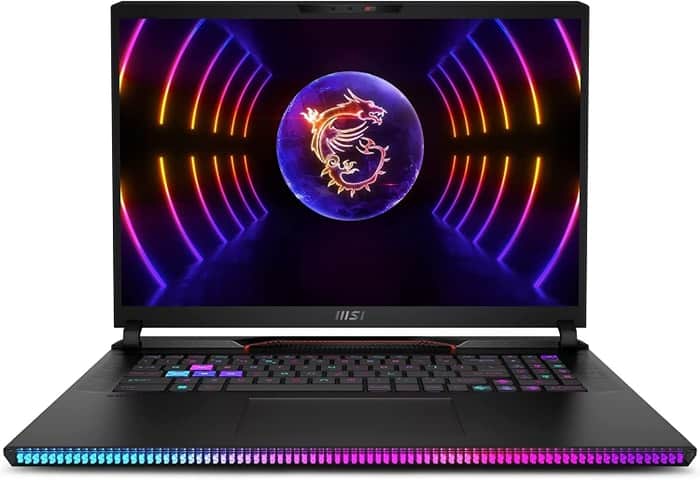
5.MSI Raider GE78 HX 13VI-079US
Powerful, portable gaming powerhouse with a distinct, robust design- Exceptional gaming performance
- Maintains decent portability despite its power
- Features a bright, vibrant display
- Offers an abundance of connectivity ports
- Can produce significant noise during gaming marathons
- For higher performance, pricier high-end laptops can be considered
- Less powerful compared to larger gaming laptops
- Adding a new SSD could be problematic
Summary
A true gaming contender in the market, MSI's Raider GE78 HX expertly harmonizes essential gaming aspects - power, portability, and aesthetics. Living up to its gaming lineage, the Raider GE78 HX stands as a tour de force among its contemporaries due in part to its robust internal configuration, proving its mettle in heavy-duty gaming scenarios and demanding work applications. Its luminous, highly detailed display adds more depth to the gaming experience, beautifully rendering the intense graphics of modern games.
Although a powerful machine, the Raider GE78 HX does not sacrifice portability. It retains a reasonably compact form factor, making it a valuable companion for mobile users who demand gaming power on the go. The laptop also features a wealth of ports, catering to a multitude of gaming hardware needs. But for all its strengths, it can get conspicuously noisy during lengthy, intensive gaming sessions, which can hamper the immersive experience.
Gamers on the hunt for even greater power may necessitate exploring higher-end, more premium alternatives such as the Asus ROG Strix Scar 18 or MSI Titan GT77 HX. These bigger machines offer top-tier GPUs, but they come with a considerably heftier price tag. Users who prefer a smaller, more portable laptop could consider the Asus ROG Strix G16; however, this comes with limitations in power, display capabilities, and webcam quality.
In terms of aesthetics, the GE78 HX Raider boldly embraces a design that unabashedly signals its gaming roots. Taking cues from the high-end Titan series, this laptop sports a race car-inspired detail on its lid, giving it a touch of sporty elegance. However, potential upgrades, like adding a new SSD, can be arduously difficult. Despite this minor setback, the GE78 HX Raider brings excellent value to the table, presenting a splendid blend of top-tier performance, portability, and aesthetic appeal.
Might be interesting
- Best Laptop for Davinci Resolve 17
- Best Laptops for Video Editing under $1500
- Best Laptops for Calman Video Pro
- Best Laptop for Adobe Premiere Pro CC 2023
Table of the Best Laptops for DaVinci Resolve 18
| Laptop | Price (approx) |
| HP Victus 15 | $880 |
| Dell G16 | $1,510 |
| ASUS ROG Strix Scar | $2,050 |
| Lenovo Legion Pro 7i 16 | $3,390 |
| MSI Raider GE78 HX 13VI-079US | $5,450 |

